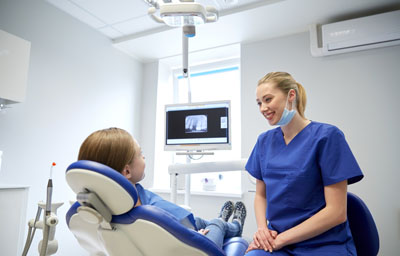A routine dental exam is the best way to identify tooth decay. This exam gives your dentist and/or his staff the opportunity to examine your mouth for signs of tooth decay and other issues or abnormalities. The purpose of identifying tooth decay during routine dental exams is to catch it as early as possible and provide subsequent treatment.
The Frequency of Routine Dental Exams
Routine dental exams should occur at least once every six months. Some dentists and patients prefer to have these check-ups once every three or four months just to be on the safe side. When in doubt, reach out to your dentist to determine the frequency of dental exams that is most appropriate for your unique oral health.
If you smoke, have cavities or have a genetic predisposition for gum disease and/or tooth/root decay, a routine dental exam every three months might be ideal.
What Happens During the Dental Exam?
The dentist and his or her staff will perform a comprehensive examination of your teeth and gums. The exam will provide a comprehensive summary of your unique oral health. You will be asked questions about your dental history, medical history and oral hygiene. The dentist will look closely at each tooth for signs of tooth decay.
The dentist will examine your diagnostic X-rays, known as radiographs. This is essential to detect tooth decay as well as tumors, bone loss and cysts. All tooth surfaces are examined with specialized dental instruments for signs of decay.
What Happens if Tooth Decay is Identified?
If there are signs of tooth decay, the dentist will likely ask detailed questions about your brushing and flossing habits. The frequency of brushing and flossing matters a great deal in the context of tooth decay. Even the products one uses for oral hygiene and the cleaning techniques play important roles in preventing tooth decay.
Furthermore, the dentist will likely ask questions about whether the patient uses toothpaste with fluoride and if one consumes water containing fluoride. This information is necessary for the dentist to provide suggestions as to how the patient can improve oral hygiene habits to prevent additional tooth decay.
Why Routine Dental Exams are an Absolute-Must
Take a moment to consider the pain and annoyance involved in your last cavity. Wouldn’t it be nice to minimize those feelings or completely prevent them? Visit the dentist for routine dental exams and your tooth decay will be identified as soon as possible.
Early diagnosis reduces the need for deep drilling and other possible invasive procedures that might prove somewhat painful and undoubtedly cost additional money. So do not delay check-ups at the dentist. The early identification of tooth decay will dramatically increase the potential for successful treatment.
